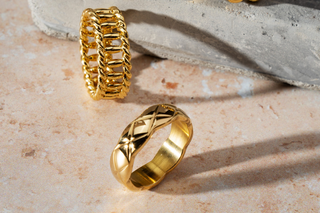Gold is among the most sought-after precious metals due to its timeless beauty and rarity. It's a popular choice for jewelry, coins, and other decorative items. However, many people are often concerned about the durability of gold and whether it tarnishes over time. In this blog, we will provide the facts and debunk some common misconceptions surrounding the question, "Does gold tarnish?"
What is Tarnish?
Before we dive into the details of gold tarnishing, let's first define what tarnish means. Tarnish is the dulling or discoloration of a metal surface due to its exposure to air, moisture, and other environmental factors. It commonly appears as a thin layer of corrosion, often with a darker or brownish color.
Does Gold Tarnish?
The short answer is no, gold does not tarnish. Unlike other metals such as silver and copper, gold is highly resistant to corrosion and thus does not oxidize or tarnish quickly. Therefore, if you own a gold piece that has changed color, it is likely due to other factors, such as a reaction with other metals or dirt buildup.
However, there are a few exceptions to this rule. While pure gold is resistant to tarnishing, jewelry, and other gold items are rarely made of pure gold. Instead, they are often mixed with other metals, such as copper, nickel, or zinc, to improve their durability and hardness. These alloys can be subject to tarnishing, especially if they contain a high percentage of copper.
How to Prevent Gold from Tarnishing?
1. Protect Gold from Moisture
Moisture is a common factor that causes gold to tarnish. Therefore, it is essential to keep the gold jewelry dry and avoid exposing it to water. Remove gold jewelry before bathing, swimming, or engaging in water-related activities.
2. Store Gold Properly
Proper storage of gold jewelry can prevent tarnishing. Store gold jewelry in a cool, dry, and dark place. Avoid exposure to light and air, as they can contribute to tarnishing. Wrap the gold jewelry in a soft cloth or an anti-tarnish paper to minimize exposure to air.
3. Avoid Contact With Direct Heat
Gold is a soft metal that can warp or melt when exposed to direct heat. Avoid exposing gold jewelry to direct sun rays, hot surfaces, or any direct heat source, as it can cause tarnishing.
4. Clean Gold Jewelry Regularly
Regular cleaning of gold jewelry can prevent tarnish buildup. Use a mild soap and water solution, rinse thoroughly, and dry using a soft cloth. Avoid using harsh chemicals or abrasive materials that can scratch the gold surface.
5. Avoid Contact With Chemicals
Chemicals such as perfume, hairspray, and cleaning agents can accelerate the tarnishing of gold jewelry. Avoid wearing gold jewelry when using these chemicals, as they can weaken the structure of the gold, leading to tarnishing.
6. Use Anti-Tarnish Strips
Anti-tarnish strips are designed to absorb the moisture and gases that cause tarnishing. Place one or two anti-tarnish strips in the jewelry box to prevent the tarnishing of gold jewelry.
Conclusion
In conclusion, gold is a precious metal highly resistant to tarnishing. However, gold alloys may tarnish over time if they contain copper or other corrosion-resistant metals. To prevent your gold items from tarnishing, it's essential to store them properly, avoid exposure to harsh environments, and clean them regularly. At San Jose Jewelers, we offer high-quality gold jewelry crafted to last a lifetime. Contact us today to learn more about our exquisite gold pieces.


